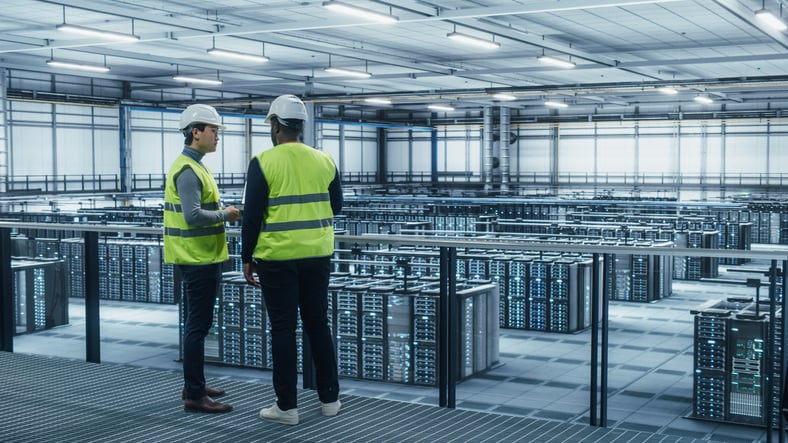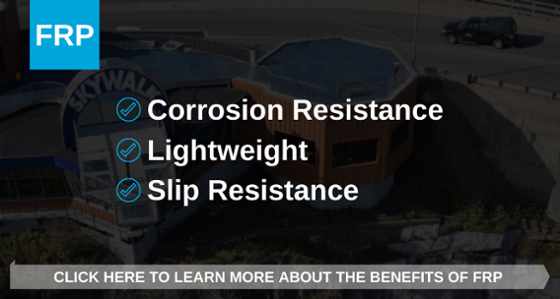As critical infrastructure, data centers must have safety as a top priority. From fire protection...
Building a Data Center That’s Safer and More Durable with FRP
As critical infrastructure, data centers must have safety as a top priority. From fire protection to structural integrity, every aspect of design requires careful consideration to build a data center that keeps both workers and technology safe.
Fiberglass reinforced plastic (FRP) has gained prominence in various industries for its exceptional safety properties. Its resistance to fire, chemicals, and physical damage makes it an ideal choice for demanding environments. In this blog, we explore how you can use FRP to build a data center that’s safer and more durable.
Prioritizing Fire Safety: Building a Data Center With FRP
Fire safety is a paramount concern in data centers, where sensitive equipment and valuable data are at risk. Traditional materials like wood, steel, and some plastics can contribute to fire spread and generate toxic fumes when ignited. In contrast, FRP offers several advantages.
Many FRP composites are formulated to be self-extinguishing, meaning they stop burning once the ignition source is removed. This inherent property significantly reduces the risk of fire spread. Additionally, FRP can be designed to produce minimal smoke and toxic fumes when exposed to fire, crucial for maintaining visibility and protecting personnel in case of an emergency.
These characteristics make FRP a strong contender for various data center components, contributing to a safer overall environment.
Strength and Durability for Enhanced Safety
FRP offers exceptional strength and durability, making it a reliable choice for various components when building a data center. Its high strength-to-weight ratio allows for robust structures without adding excessive load to the building.
The lightweight properties of FRP also make installation much easier than traditional materials. Unlike steel, which is very heavy and susceptible to corrosion, FRP maintains its structural integrity in challenging environments. This is especially important in coastal regions or areas with high humidity, where corrosion can compromise the building's structural integrity. Additionally, FRP's resistance to impact and weathering ensures long-term performance, minimizing the risk of damage.
Build a Data Center With Thermal Stability and Electrical Safety
Data centers house sensitive electronic equipment that requires a stable environment for optimal operation. FRP contributes to a safer operating environment through its thermal and electrical properties.
Thermal Stability: FRP possesses excellent heat resistance, making it suitable for environments with fluctuating temperatures. Unlike materials that can warp or degrade under heat stress, FRP maintains its structural integrity. This stability is crucial for maintaining consistent conditions within the data center.
Electrical Safety: FRP is inherently non-conductive, providing superior electrical insulation. This property is vital in preventing electrical fires and shocks, common hazards in environments with extensive electrical systems. By reducing the risk of electrical incidents, FRP enhances the overall safety of data center personnel and equipment.

Slip Resistance and Chemical Resistance
Safety in data centers extends beyond fire and structural integrity. Slip and fall accidents, as well as exposure to chemicals, can pose significant risks to personnel. FRP addresses these concerns effectively.
Slip Resistance: While data centers are generally humidity-controlled environments, the potential for spills, condensation, or even dropped liquids exists. FRP can be formulated with slip-resistant coatings, providing an added layer of safety for personnel. This is particularly important in high-traffic areas and on raised flooring, where the risk of falls can be increased.
Chemical Resistance: Data centers may handle various chemicals, from cleaning agents to cooling fluids. FRP's inherent resistance to chemicals protects both personnel and equipment from potential hazards. Its non-porous surface prevents chemical absorption, minimizing the risk of contamination and equipment damage.
Specific Applications of FRP in Data Centers
To maximize safety and performance, FRP can be incorporated into various components within a data center:
- Raised Flooring: FRP raised flooring systems offer several advantages. They are resistant to water damage, which can occur from leaks or spills. Additionally, FRP flooring is often easier to clean and maintain than traditional materials.
- Wall Panels: FRP panels provide a durable, fire-resistant, and easy-to-clean surface. They can also be used to create clean rooms or containment areas within the data center.
- Cooling Towers and HVAC Components: FRP's corrosion resistance and durability make it an ideal material for cooling towers and other HVAC components. It can withstand exposure to harsh weather conditions and chemicals.
- Enclosures and Racks: Protecting sensitive equipment is crucial. FRP enclosures and racks offer excellent protection against dust, moisture, and physical damage.
- Walkways and Platforms: FRP walkways and platforms provide safe and slip-resistant access to elevated areas,reducing the risk of falls.
- Cable Trays: FRP cable trays offer superior corrosion resistance and electrical insulation, protecting cables and improving overall safety.
By incorporating FRP into these areas, data center operators can create a safer, more resilient, and efficient facility.
Build a Data Center That Will Keep Your People and Your Equipment Safe
By incorporating FRP into data center design, facility managers can significantly enhance safety while reducing maintenance costs. FRP's inherent fire resistance, strength, durability, thermal stability, electrical safety, and slip resistance make it a superior choice for various components.
From raised flooring and wall panels to work platforms and enclosures, FRP offers a comprehensive safety and durability solution. By prioritizing safety and selecting materials like FRP, data center operators can protect personnel, equipment, and valuable data.
To learn more about how FRP can benefit your data center, contact Fibergrate today. Our experts can help you design a safer and more efficient facility.
Topics: FRP, Employee Safety, Data Center


